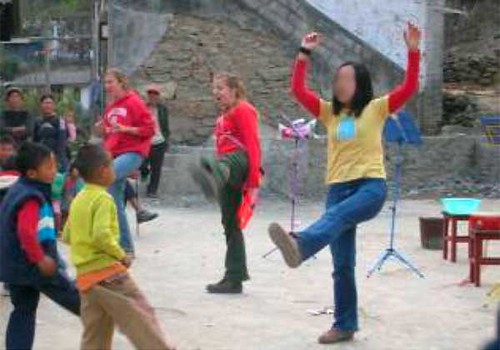West of Shangri-la in southwesterly Yunnan province, a remote corner of the Tibetan plateau borders Burma. It’s comprised mostly of the Lisu and Nu minorities: who together number just thousands in China’s billion plus population. This is China at its most different to the smoggy, swotty university district of Beijing. And it’s where Mary spent her spring festival break.
She and friends spent a week moving from village to village – with such colourful names as Wawa – bringing the children medical supplies, basic hygiene lessons, and musical evenings. This was a combined effort of two non-profit organisations, MCC and HAND, but the initiative behind the trip was all Mary’s. Coming back to Beijing, though, she couldn’t help feeling sad:
I wanted to help, but felt helpless. You can bring one happy day [to the children] but then you go … It makes me appreciate my life more.
It’s needless to say this is a very poor region of China. And Mary rubbed up against it’s more pitiful side: helping children with disabilities in particular. She also described seeing three very sick elderly women, one of whom they suspected had breat cancer. But they couldn’t take her to hospital, as their medically trained consultant was already on his way to Kunming.
Coming face to face with suffering like this is something I would have imagined would test a Christian’s faith. Not Mary’s. Or those she was helping. Roughly 70% of the region’s population is Christian, thanks to the missionaries set up in the early twentieth century by the Brit James Fraser. Is this one of the reasons the area appealed to Mary? Did she find it especially rewarding to help those of the same faith as her? I’ll ask next time I can … or if you’re reading this, Mary, reply in the comments!
A final footnote is one of Mary’s comments on living with the Lisu and Nu minorities. She noticed at several points babies playing near fires while their parents didn’t intervene. This, she felt, was a result partly of poverty (wholly, in my less informed opinion) but partly a genuine difference between theirs and the Han Chinese ethnicity. “Han take care of their children.”


